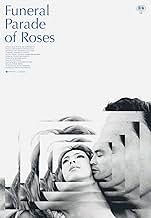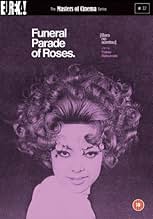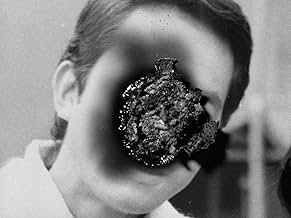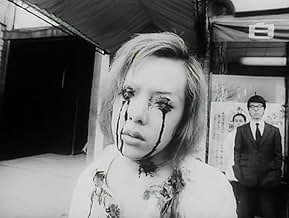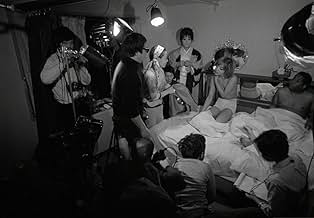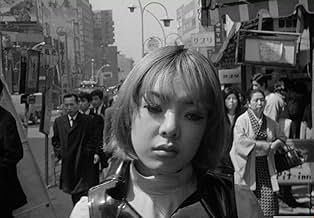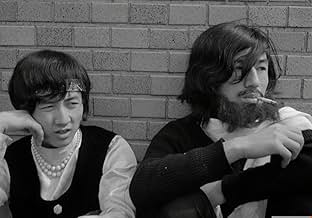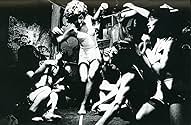IMDb-BEWERTUNG
7,7/10
8019
IHRE BEWERTUNG
Die Prüfungen und Trübsale von Eddie und anderen Transvestiten in JapanDie Prüfungen und Trübsale von Eddie und anderen Transvestiten in JapanDie Prüfungen und Trübsale von Eddie und anderen Transvestiten in Japan
Empfohlene Bewertungen
10NateManD
"Funeral Parade of Roses" is an underrated unknown work of Japanese gay cinema. It was one of Stanly Kubric's favorite films, and it had a significant influence on the the style of "A Clockwork Orange". The film deals with Japanese drag queens, including the clubs, rivalry and their sex lives. In an Oedipus fashion, except reversed, the main character kills his mother so he can have relations with his father. Director Toshio Matsumato seemed to be way ahead of his time for his portrayal of sexuality and violence on screen. Also in a Bergman like fashion, actors are interviewed so the audience realizes it's only a movie.(and a twisted one at that) The film has many hallucinatory scenes, and who could forget the drag queens using urinals. There's also a weird fight scene between the two drag queens, and when they yell comic bubbles pop out of their mouths. Thank God this movie is in black & white! It's very brutal, disturbing and violent at times; so watch with caution. "Funeral Parade of Roses", is simply shocking and brilliant!
This is a movie that was made in the late '60s, early '70s period of Japan when Japan influenced by the Hippie culture was experimenting with their own brand of Avant Garde culture that was sometimes called "Angura". This is shortened Japanese pronunciation for "Underground". As the word suggests, these were experimental non-mainstream production that explored much about free sex, and anti establishment view of the world.
Gay culture was almost never picked up in Japanese movie up to this point, and it was first public exposure to the literally underground culture of the society at that time. This movie was also the debut for Pita or Shinnosuke Ikehata as Eddie. He has become somewhat of an icon for gay culture in Japan, but this movie was actually the first time he appeared as gay in public, and prior to that, he was only known as a beautiful boy dancer. His father was a natori of Japanese dance school, and he is a trained dancer himself.
Producers of this movie auditioned over 100 candidates, but couldn't find the right talent. Novel writer Tsutomu Minakami told the producers about "this boy" who was a go go dancer at a club in Roppongi. When the producers went to the club, and met the then 16 year old Ikehata, they knew they had the right person. Ikehata had a nick name Pita from Peter Pan, as he was so beautiful, and it was difficult to tell if he was a boy or a girl.
Story is bit convoluted, Eddie, who is the top host at the club Junne has intimate relation with the club's owner Gonda (Yoshio Tsuchiya). When the madam of the club Leda discovers this, he goes into a jealous frenzy, and tries to hurt Eddie. Eddie gets an idea to kill Leda, but that also brought back his suppressed memory of killing his own mother. Leda makes an attempt on Eddie's beauty by trying to cut his face, but fails. Gonda dumps Leda, and Leda commits suicide. But Gonda finds out the real truth about the relation between himself and Eddie.
The production of this movie is above average for avant garde movies made during this period. There's humor, talent, interesting point of view, and a real story. This is one of must see movies to come out of Japan.
Gay culture was almost never picked up in Japanese movie up to this point, and it was first public exposure to the literally underground culture of the society at that time. This movie was also the debut for Pita or Shinnosuke Ikehata as Eddie. He has become somewhat of an icon for gay culture in Japan, but this movie was actually the first time he appeared as gay in public, and prior to that, he was only known as a beautiful boy dancer. His father was a natori of Japanese dance school, and he is a trained dancer himself.
Producers of this movie auditioned over 100 candidates, but couldn't find the right talent. Novel writer Tsutomu Minakami told the producers about "this boy" who was a go go dancer at a club in Roppongi. When the producers went to the club, and met the then 16 year old Ikehata, they knew they had the right person. Ikehata had a nick name Pita from Peter Pan, as he was so beautiful, and it was difficult to tell if he was a boy or a girl.
Story is bit convoluted, Eddie, who is the top host at the club Junne has intimate relation with the club's owner Gonda (Yoshio Tsuchiya). When the madam of the club Leda discovers this, he goes into a jealous frenzy, and tries to hurt Eddie. Eddie gets an idea to kill Leda, but that also brought back his suppressed memory of killing his own mother. Leda makes an attempt on Eddie's beauty by trying to cut his face, but fails. Gonda dumps Leda, and Leda commits suicide. But Gonda finds out the real truth about the relation between himself and Eddie.
The production of this movie is above average for avant garde movies made during this period. There's humor, talent, interesting point of view, and a real story. This is one of must see movies to come out of Japan.
An unsettling and astonishing Japanese film that introduced me to the Japanese New Wave movement.
"Funeral Parade of Roses," like many of the best works of art, defies description or categorization. It dives into the Japanese gay sub-culture of the 1960s, and specifically young gay men who dress and act like women. It blurs the line between fact and fiction; at times, the actors in the movie become actors in a movie within the movie, and the movie itself becomes a documentary about the making of a movie about gay Japanese youths. If you can follow that sentence, then you're on the way to having the right sensibility to enjoy this film.
It's a shocking movie too, going places most other films at the time, and certainly few American movies, would dare. The only big American movie I can think of from that time period that comes even close to tackling subjects that general audiences would find equally unsavory is "Midnight Cowboy," and this film makes that one look like a Doris Day romp in comparison.
Grade: A
"Funeral Parade of Roses," like many of the best works of art, defies description or categorization. It dives into the Japanese gay sub-culture of the 1960s, and specifically young gay men who dress and act like women. It blurs the line between fact and fiction; at times, the actors in the movie become actors in a movie within the movie, and the movie itself becomes a documentary about the making of a movie about gay Japanese youths. If you can follow that sentence, then you're on the way to having the right sensibility to enjoy this film.
It's a shocking movie too, going places most other films at the time, and certainly few American movies, would dare. The only big American movie I can think of from that time period that comes even close to tackling subjects that general audiences would find equally unsavory is "Midnight Cowboy," and this film makes that one look like a Doris Day romp in comparison.
Grade: A
If you really are looking for a good time in a movie theatre - watch this movie ! It has been said that some of Kubrick's visual and sonic ideas for "Clockwork Orange" were inspired by this movie; after having seen it, i'm more than convinced that this is true.
This movie offers a lot of cinematic ideas and it uses surprising ways to make a point within a story.
What is the reason that films with a spirit and mood like that have vanished from the screen ? Have the politics in the movie industry really become so strict ? This movie watched nowadays has (but maybe had always) a subversive feel to it, why is that ?
It definitely offers something different and therefore would be very welcome in movie theatres and videostores around the world to free us from all the uninspired formula movies.
This movie offers a lot of cinematic ideas and it uses surprising ways to make a point within a story.
What is the reason that films with a spirit and mood like that have vanished from the screen ? Have the politics in the movie industry really become so strict ? This movie watched nowadays has (but maybe had always) a subversive feel to it, why is that ?
It definitely offers something different and therefore would be very welcome in movie theatres and videostores around the world to free us from all the uninspired formula movies.
I didn't know anything about this movie when a friend of mine recommended it in the most enthusiastic way. The guy is a a very young movie buff, with a keen interest in quality movies (experimental, avant-garde, new wave, independent, iconoclast, unorthodox, stuff like that). I share his interests (despite my old age), and any discussion we have is real brainstorming. Two days ago he told me about planning to organize kind of jam-session with friends of his age to watch a battery of movies (I declined the invitation: No Country for Old Men). "Funeral Procession of Roses" was mentioned in this context.
Back home I found references about the movie on the web, then a copy of the film on you Tube, with Spanish subtitles. I stayed long in night to watch the movie. Really a great cinematic experience. As I said, I didn't know anything about it, nor about director Toshio Matsumoto. A movie from 1969, belonging to the "Nuberu Bagu", the Japanese New Wave, recalling all I knew about that period in the history of Nippon cinema, first of all bringing back to my memory the four or five movies by Oshima that I had the chance to watch.
You say "Nuberu Bagu", you say Buñuel on the steroids; and the film of Matsumoto is no exception: the ending scene of "Funeral Procession of Roses" is a direct reference to the beginning of "Un Chien Andalou": tribute paid to the famous scene from Buñuel, also creative re-enactment, also shifting the sense of it toward new territory, toward Buñuel encountering Aeschylus and Sophocles on a street in Tokyo among busy passers-by.
It's not a movie for the sissies, this "Funeral Procession of Roses". It acts on multiple strata, and each strata is challenging. A movie solidly placed in the underground culture, exploring the gay universe - a night club of sorts with two drag queens in bitter conflict, the club owner trying to keep the balance between them. All this approached with a raw Neorealist eye, à la Fellini, à la Juan Antonio Bardem. Over the plot comes a documentary, every now and then the action is stopped and one or other of the actors is interviewed: a movie about trans genders, played by trans genders, how do they view their sexual condition, how do they relate with the movie they play in. Is it a documentary about a gay movie on the making? Is it just a documentary about the LGBT condition, using feature sequences to emphasize some points? Actually everything in the movie is left in an indeterminate state, and this is on purpose. Is it a feature or a documentary? Are the actors playing actors, a movie within a movie? Are those guys trans genders, or girls impersonating trans genders, or what? Is the paradigm of Oedipus (re-enacted in the movie in a quirky way) just what we know it is? Is this a supremely iconoclastic interpretation of Augusto Monterosso's "La cucaracha soñadora" - moved in a Tokyo gay bar of the sixties? ("There was a cockroach named Gregor Samsa who was dreaming he was a cockroach named Franz Kafka who was dreaming he was an author writing some story about a clerk named Gregor Samsa who was dreaming he was a cockroach"). Gosh, no!
And I think this is the ultimate meaning of the Funeral Procession of Roses: it speaks us about the frailty of our certitudes: be it reality versus illusion of reality, be it gender strict determination, be it our ultimate identity. "Mis circunstancias son como las suyas. Ésa es una de las razones"... Yep, not for the sissies.
Back home I found references about the movie on the web, then a copy of the film on you Tube, with Spanish subtitles. I stayed long in night to watch the movie. Really a great cinematic experience. As I said, I didn't know anything about it, nor about director Toshio Matsumoto. A movie from 1969, belonging to the "Nuberu Bagu", the Japanese New Wave, recalling all I knew about that period in the history of Nippon cinema, first of all bringing back to my memory the four or five movies by Oshima that I had the chance to watch.
You say "Nuberu Bagu", you say Buñuel on the steroids; and the film of Matsumoto is no exception: the ending scene of "Funeral Procession of Roses" is a direct reference to the beginning of "Un Chien Andalou": tribute paid to the famous scene from Buñuel, also creative re-enactment, also shifting the sense of it toward new territory, toward Buñuel encountering Aeschylus and Sophocles on a street in Tokyo among busy passers-by.
It's not a movie for the sissies, this "Funeral Procession of Roses". It acts on multiple strata, and each strata is challenging. A movie solidly placed in the underground culture, exploring the gay universe - a night club of sorts with two drag queens in bitter conflict, the club owner trying to keep the balance between them. All this approached with a raw Neorealist eye, à la Fellini, à la Juan Antonio Bardem. Over the plot comes a documentary, every now and then the action is stopped and one or other of the actors is interviewed: a movie about trans genders, played by trans genders, how do they view their sexual condition, how do they relate with the movie they play in. Is it a documentary about a gay movie on the making? Is it just a documentary about the LGBT condition, using feature sequences to emphasize some points? Actually everything in the movie is left in an indeterminate state, and this is on purpose. Is it a feature or a documentary? Are the actors playing actors, a movie within a movie? Are those guys trans genders, or girls impersonating trans genders, or what? Is the paradigm of Oedipus (re-enacted in the movie in a quirky way) just what we know it is? Is this a supremely iconoclastic interpretation of Augusto Monterosso's "La cucaracha soñadora" - moved in a Tokyo gay bar of the sixties? ("There was a cockroach named Gregor Samsa who was dreaming he was a cockroach named Franz Kafka who was dreaming he was an author writing some story about a clerk named Gregor Samsa who was dreaming he was a cockroach"). Gosh, no!
And I think this is the ultimate meaning of the Funeral Procession of Roses: it speaks us about the frailty of our certitudes: be it reality versus illusion of reality, be it gender strict determination, be it our ultimate identity. "Mis circunstancias son como las suyas. Ésa es una de las razones"... Yep, not for the sissies.
Wusstest du schon
- WissenswertesFuneral Parade of Roses (1969) gave Stanley Kubrick several visual and aural inspirations for his adaptation of Uhrwerk Orange (1971).
- PatzerAlle Einträge enthalten Spoiler
- VerbindungenEdited from Ecstasis (1969)
- SoundtracksO du lieber Augustin
Top-Auswahl
Melde dich zum Bewerten an und greife auf die Watchlist für personalisierte Empfehlungen zu.
- How long is Funeral Parade of Roses?Powered by Alexa
Details
Box Office
- Weltweiter Bruttoertrag
- 1.114 $
- Laufzeit
- 1 Std. 45 Min.(105 min)
- Farbe
- Sound-Mix
- Seitenverhältnis
- 1.37 : 1
Zu dieser Seite beitragen
Bearbeitung vorschlagen oder fehlenden Inhalt hinzufügen


